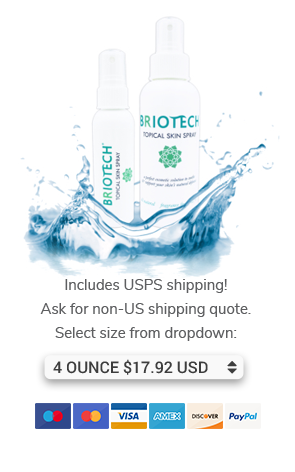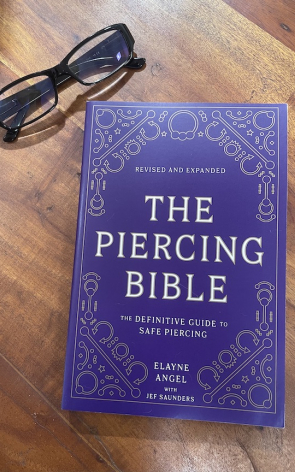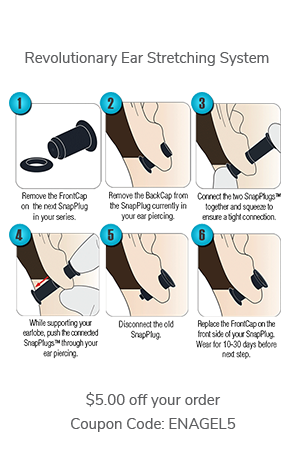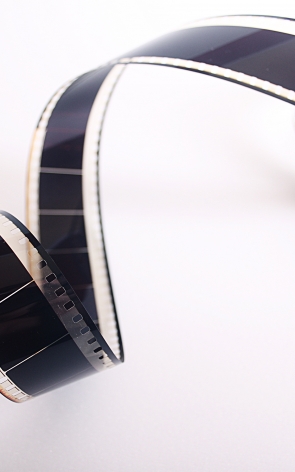I received this message today:
Hello Elayne,
I have a question for you concerning my Prince Albert piercing. I've had it for about 2 1/2 months now. I was not sexually active for about a month after getting the piercing, but ever since I've resumed sexual activity the piercing gets sore during intercourse.
Last night, after having sex, I noticed that there was blood in the condom I was wearing. The piercing feels absolutely fine when I'm not having sex, it looks completely healed and I can rotate the CBR without any soreness. However, logic would lead me to believe that it is not completely healed- hence the soreness and bleeding from intercourse.
My question is this: is it normal for a Prince Albert piercing to take this long to heal? And should I refrain from sexual activity completely during the remainder of the healtime? Any and all advice would be gladly appreciated. Thank you. H.
My response:
Hi H.,
Thanks for your message.
You do need to listen to your body, and even if you're not experiencing pain, if you're seeing blood, that means what you're doing is too rough for your body at this stage of healing for you.
This part of my book, The Piercing Bible, addresses your question:
Healing vs. Healed
Your piercing has passed through the first two stages of healing when there is no tenderness, no secretions forming a crust, and no discoloration. The openings look smooth and sealed, not raw or ragged. If there is sebum present in your piercing, this is a good indication that you no longer have an open wound. Your piercing has passed through the initial healing and entered the final stage, maturation.
After the channel forms and seals, you are still in the third stage, as the scar matures over a long period of time. A piercing that has only recently healed is more delicate than a seasoned one. The skin can be broken, turning your piercing into an open wound again. Just because a piercing has made it through initial healing doesn’t mean that it can’t regress if it is mistreated.
So, chances are, you're essentially healed, but the activity of intercourse breaks your skin and causes trauma, and soreness. Perhaps you should try a curved bar to see if the minimized jewelry results in less trauma to your piercing? You should definitely continue with your usual aftercare regimen and be gentle with it for a while. And follow the rules for sexual activity:
Safer Sex
There is no set period for abstinence from sexual activities while genital piercings are healing. There are, however, two nonnegotiable rules:
1. Be gentle. Pay attention to your body. If your piercing feels sore, you must stop what you’re doing, or at least ease up. As you begin to heal and the piercing feels less tender, you must still be vigilant to avoid injuring the fragile new cells.
2. Be clean and hygienic. Protective barriers must be used to prevent the sharing of bodily fluids. For oral sexual contact, use a dental dam (sheet of latex) to shield female genitalia and a flavored or unlubricated condom during fellatio. Thoroughly wash hands and sex toys before contact near a healing piercing, and use condoms for all intercourse and on insertables like dildos and bullet-type vibrators. If other barriers aren’t suitable, apply a waterproof dressing such as a Nexcare or Tegaderm before sexual activities to keep your partner’s body fluids from getting on your piercing. All of these precautions are mandatory to prevent infection during the entire initial healing period, even if you and your partner are monogamous and healthy.
Appropriate body jewelry is smooth, so high-quality condoms that fit prop- erly should perform well. Water-based lubricant helps reduce excess friction to protect the integrity of the latex. The sensitivity of your healing piercing can make up for the addition of an unfamiliar barrier. Pleasure Plus condoms are made with extra room that is suited to frenum and Prince Albert jewelry. Avoid condoms and lubricants with the spermicide nonoxynol-9 (N-9), as this harsh chemical may burn or sting and can harm the delicate cells of a fresh piercing (as well as vaginal or rectal tissue).1
I hope you find this information helpful.
Sincerely,
Elayne
Elayne Angel, Author
The Piercing Bible--The Definitive Guide to Safe Body Piercing
Medical Liaison, Association of Professional Piercers
[email protected]
http://piercingbible.com/
http://www.facebook.com/elayneangel
http://twitter.com/elayneangel
http://www.linkedin.com/in/authorelayneangel




